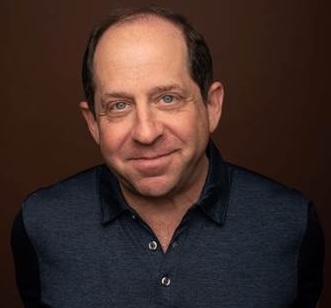By Brian Scott Lipton . . .
One of the most familiar faces in a variety of mediums – theater, film and TV – Jason Kravits is, by his own definition, “a shape-shifter,” a trait which has allowed him to work consistently for the past three decades.
That talent is coming in particularly handy in the New Group’s splendid production of Sabbath’s Theater, now at the Pershing Square Theater Center. Based on Philip Roth’s award-winning novel of the same name, the piece stars John Turturro as the sexually deviant, deeply unhappy theater maker Mickey Sabbath, alongside Elizabeth Marvel as all the women in Mickey’s life and Kravits as a variety of male characters.
Theater Pizzazz recently spoke to Kravits about his involvement with the project, the challenges of adapting a large novel into a one-act play, his approach to playing different characters, and his love of his profession.

TP: How did you get involved in this project?
JK: Many years ago, John directed me in the Broadway play Relatively Speaking, and, since then, he’s called me to do a lot of readings of his movies. About two years ago, he invited me to do a reading of this play. I think one reason John called me is that he knows I like to “shape shift” on stage. I am so honored to be doing this show: a three-person play with two of the best actors in the business! Beth is so talented, yet her work ethic is so grounded. She’s such a lovely person with very little ego. And getting to watch her and John work together in their scenes is a dream to witness. I sometimes have to pinch myself that I am in the same room.
TP: Were you familiar with the book before you did the reading?
JK: I was familiar with Roth’s work, but I did not read this book until I got involved with the project. I feel like Roth is the Tom Waits of novel writers; he can be vulgar and then break your heart. Honestly, to tell the story of this outrageous character who can still elicit empathy — it’s pretty amazing.
TP: How hard has it been to turn this massive, 350-page novel into a one-act play?
JK: It’s funny, after one performance, some woman in the lobby came up to me to complain about all the cuts. And John and our co-author Ariel Levy have been constantly cutting material during previews, tightening the text to make it speedier. Of course, it’s been hard for them to narrow down this story and keep Roth’s language and poetry. But I think they were very selective about what we kept in, and some things got cut because they went too far. In the end, everything we do is about making strong character choices so the audience can understand why these characters make their choices – even when they’re shocking or vulgar. But there’s no question, we could do two more plays with material that was cut from the book.
TP: You play a few characters in the show. But let’s focus on your two main ones: Mickey’s 100-year-old cousin, Fish, and his longtime friend, Norman Cowan. How did you develop these vastly different people?
JK: For Fish, I relied on people I know; in fact, some people in my family lived past 100! Part of the key to Fish is little specifics in vocalization. He was born in Russia and grew up in a household speaking Russian Yiddish, so you have to re-create specific sounds like the R in Russia. There’s also some New Jersey in the way he talks because that’s where he grew up. As for the physicality, again, that is based on people I know, how their back stoops or how their eyes don’t work completely. It’s so important to me that Fish is not a caricature. Norman was harder to latch onto because, in the book he is defined in much larger passages. But let’s say we all know people on the Upper West Side who are just like Norman.
TP: How important was to have both a female co-writer and female director, the great Jo Bonney?
JK: When Elizabeth was in the room, there were more women than men! But it was really useful to have that feminine energy and have women in those vital roles both watching and judging what we did. Interestingly, Jo is completely the opposite from John; she is quiet but yet determined. John is loud! It was great to have that balance!
Your career encompasses everything: Broadway and Off-Broadway, your award-winning one-man show, “Over the Top,” and lots of film and television. Are you living the dream?
From the time I was a child, I’ve wanted to do anything and everything in the arts. Everyone in my family could entertain – we all have this vaudeville sensibility – but no one did it professionally. I wanted to be Harpo Marx and Chico Marx at the same time. I wanted to tap dance, to do Shakespeare, to do TV and film, and the fact that I can is amazing. But the truth is if you’re not immediately successful in something, you have to learn to do everything. I was originally from Washington DC and down there I did two or three plays a year. Then I moved to New York at 28 and everything stopped for me, except doing commercials. So, I started doing my own material, then my TV career picked up, and then I did The Drowsy Chaperone. So right now, I’ll happily do it all – or at least whatever they pay me for! If anyone has a part for me – or a plan for me – I’m ready to listen!
Sabbath’s Theater continues at the Pershing Square Signature Center (480 West 42nd Street) through December 17. For tickets and information, visit www.thenewgroup.org


















